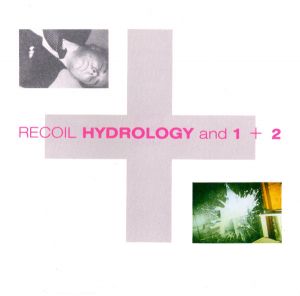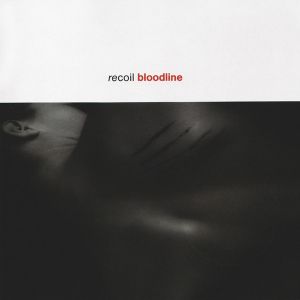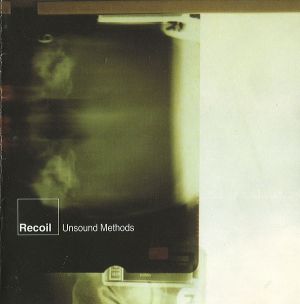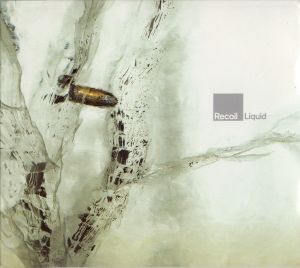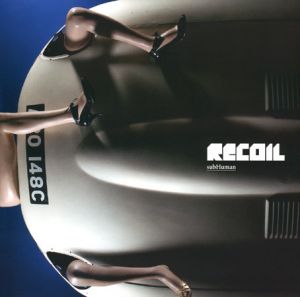List of Recoil sample sources by album
- This article is about the various sample sources used on Recoil songs and official remixes. For sample sources used on Depeche Mode works, see Depeche Mode sample sources. For sample sources used on Martin Gore works, see List of Martin Gore sample sources by album. For sample sources in the live arrangements of Depeche Mode songs as they were performed on the various concert tours undertaken by the group, see List of Depeche Mode live sample sources by tour.
In audio production, sampling refers to the use of a portion (or sample) from a sound within another recording. During Alan Wilder's tenure with the group, Depeche Mode were among the most prolific acts to make use of sampling technology within a traditional pop music format. Following his departure from Depeche Mode in 1995, Wilder would continue to employ sampling as a means to enhance the atmosphere of his music through the Recoil project, including passages of contemporary music, film soundtracks, sample library audio, and samples from his past work with Depeche Mode. The analysis of these sample sources and how they are manipulated is a popular topic of discussion amongst fans of both groups.
| Glossary Terms used in this article |
Information
| Key | ||||
|---|---|---|---|---|
|
|
The sample is confirmed to have been used in the specified song by a past/present member of Depeche Mode, an individual involved in its production, or band archivist Daniel "BRAT" Barassi. | |||
|
|
The sample is independently confirmed to have been used in the specified song. | |||
|
|
The sample is likely to have been used in the specified song but has not yet been confirmed. | |||
|
|
The sample is not yet confirmed to have been used in the specified song. | |||
|
|
The sample is confirmed to not have been used in the specified song. | |||
|
|
It is unclear if the sample was used in the specified song. | |||
This page aims to document all verifiable sound sources for many of the musical parts utilised by Alan Wilder for the Recoil music project in the production of its studio albums, official remixes, live performances, and other works.
Due to the manipulated nature of the samples described in this article, there is unavoidable potential for error or sample misattribution. To ensure accuracy, this article strives to use verified quotes from band members and recording personnel with citations wherever possible, audio examples, and independent research voluntarily contributed by Depeche Mode and Recoil fans across the world. This article serves to provide an interesting document on this topic in a tabular format that is organized, well-researched, and reasonably accurate. Please bear in mind that due to the limited number of relevant quotes for each sample from band members or associates involved in the production of the music described on this page, audio samples that lack official confirmation are not guaranteed to be accurate.
This article differentiates samples by their origin: Self-made samples, which describes any material originally recorded by Depeche Mode or Alan Wilder for the Recoil music project, and Sourced samples, which describe samples which were not originally recorded by either group. In addition to confirmed samples, this article also covers samples that are commonly misreported as having been used but have been directly refuted by a member or associate of Depeche Mode or Recoil.
As ever, if you notice an error, wish to contribute or request the removal of information contained within this article, please feel free to contact us.
Studio albums
1 + 2 (1986)
- Main article: List of Recoil sample sources by album/1 + 2
Hydrology (1988)
- Main article: List of Recoil sample sources by album/Hydrology
Bloodline (1992)
- Main article: List of Recoil sample sources by album/Bloodline
Unsound Methods (1997)
- Main article: List of Recoil sample sources by album/Unsound Methods
Liquid (2000)
- Main article: List of Recoil sample sources by album/Liquid
SubHuman (2007)
- Main article: List of Recoil sample sources by album/SubHuman
Concert films
A Strange Hour In Budapest (2012)
Other works by Alan Wilder
Ebbhead (1991)
- Main article: List of Recoil sample sources by album/Ebbhead
Between the conclusion of the World Violation Tour and the recording of Songs Of Faith And Devotion, Alan Wilder would enter London's KONK Studios to record Recoil's Bloodline between January and March 1991. A month later, he would return to the studio to produce Depeche Mode support act Nitzer Ebb's Ebbhead record in collaboration with producer Flood and mix engineer Steve Lyon.
Spirit of Talk Talk (2012)
"Dum Dum Girl feat. Shara Worden"
| "Dum Dum Girl feat. Shara Worden" Recoil 2012
| |||||
|---|---|---|---|---|---|
| Sample sources | |||||
| Sample | Source | Status | Notes | Audio | |
| Orchestral, ambient elements | A.R. Rahman - 127 Hours: Music from the Motion Picture - "Acid Darbari" - 2 November 2010 |
|
A reversed, manipulated section of audio derived from "Acid Darbari" by A.R. Rahman as featured on the 2010 127 Hours film soundtrack is utilised in the intro of the 2012 Recoil cover of Talk Talk's "Dum Dum Girl". | ||
| Ambient elements | A.R. Rahman - 127 Hours: Music from the Motion Picture - "R.I.P." - 2 November 2010 |
|
A manipulated section of audio derived from "R.I.P." by A.R. Rahman as featured on the 2010 127 Hours film soundtrack is utilised in the instrumental section leading up to the final chorus section of the 2012 Recoil cover of Talk Talk's "Dum Dum Girl". | ||
| Ambient elements | A.R. Rahman - 127 Hours: Music from the Motion Picture - "Liberation In A Dream" - 2 November 2010 |
|
A manipulated section of audio derived from "Liberation In A Dream" by A.R. Rahman as featured on the 2010 127 Hours film soundtrack is utilised in the instrumental section leading up to the final chorus section of the 2012 Recoil cover of Talk Talk's "Dum Dum Girl". | ||
| Percussion elements | Depeche Mode - "Nothing's Impossible" - 2005 |
|
| ||
"Inheritance"
| "Inheritance" - Recoil 2012
| ||||
|---|---|---|---|---|
| Sample sources | ||||
| Sample | Source | Status | Notes | |
| Vocal, ambient elements | Anja Garbarek - Smiling & Waving - "It Seems We Talk" - 26 March 2001 |
|
A series of manipulated audio samples derived from "It Seems We Talk" by Norweigan singer-songwriter Anja Garbarek as featured on the 2001 album Smiling & Waving are utilised throughout the 2012 Recoil cover of Talk Talk's "Inheritance". Notably, Garbarek collaborated with Mark Hollis of Talk Talk on three other songs featured on Smiling & Waving, including "The Gown", "Big Mouth", and "The Diver".[1] | |
| Snare drum | Fine Young Cannibals - The Raw & the Cooked - "She Drives Me Crazy" - 26 December 1988 |
|
A manipulated snare drum derived from the opening moments of the Fine Young Cannibals's 1988 single "She Drives Me Crazy".[footnotes 1][2] is utilised sporadically in the intro of the Recoil cover of Talk Talk's "Inheritance".[footnotes 2] | |
| Percussion elements | Depeche Mode - "Nothing's Impossible" - 2005 |
|
| |
Remixes by Alan Wilder
"Time Turns Around (Eurotech Version)"
| "Time Turns Around (Eurotech Version)" Toni Halliday 1989 |
Self-made samples | ||||
|---|---|---|---|---|---|
| Sample | Notes | Audio | |||
| Bass synth | Alan Wilder's (Eurotech Version) remix of Toni Halliday's "Time Turns Around" utilises a four-note bass synth sequence derived from a longer seven note sequence originally recorded for use throughout Depeche Mode's "Never Let Me Down Again". |
| |||
| Sample sources | |||||
| Sample | Source | Status | Notes | Audio | |
| Snare drum | Fine Young Cannibals - "She Drives Me Crazy" - 26 December 1988 |
|
A manipulated snare drum audible likely derived from the opening moments of the Fine Young Cannibals 1988 single "She Drives Me Crazy" is utilised throughout the "Eurotech" remix of "Time Turns Around". Prior to any editing applied post-sampling, the original snare's characteristic "pop" effect was achieved by recording the snare separately, then placing a speaker on top of the snare drum and a microphone below it, with the original recording played through the speaker and re-recorded.[3] Notably, this sound would later be used throughout Depeche Mode's "Halo". | ||
| Piano/bass guitar stab | Emulator III OMI Universe of Sounds Volume 1 - Funk Bass |
|
A bass guitar stab heard throughout the "Eurotech" remix of "Time Turns Around" is likely derived from the Emulator III Universe Of Sounds Volume 1 voice "Funk Bass". Notably, this sound would later see use throughout Depeche Mode's "Policy Of Truth". |
| |
"Come Alive"
| "Come Alive" Nitzer Ebb 1990
| |||||
|---|---|---|---|---|---|
| Sample sources | |||||
| Sample | Source | Status | Notes | Audio | |
| Synthesizer elements | Bassomatic - "Set the Controls for the Heart of the Bass" - 1990 |
|
A filtered rhythm element derived from a synthesizer heard in the intro of the 1990 Bassomatic song "Set the Controls for the Heart of the Bass" for the album of the same name is time-stretched and re-pitched for use in "Come Alive" starting from the four minute ten second mark.[4] | ||
| Ambient elements, phone ringing | Akai S1000/S1100 Sound Library - SE1003 BELLS - "PHONE" |
|
A manipulated sample of a telephone ringing derived from Akai S1000/S1000 sound library disk "SE1003 BELLS" is utilised sporadically throughout "Come Alive".[footnotes 3] |
| |
"In Chains (Alan Wilder Remix)"
| "In Chains (Alan Wilder Remix)" Depeche Mode 2011 |
Self-made samples | ||||
|---|---|---|---|---|---|
| Sample | Notes | Audio | |||
| Bass elements | A textured bass element originally recorded for Depeche Mode's "Black Celebration" is confirmed by Wilder as having been re-purposed for his remix of "In Chains". |
| |||
| Sample sources | |||||
| Sample | Source | Status | Notes | Audio | |
| Ambient elements | Depeche Mode - "I Want It All" - 2005 |
|
A synthesized pad phrase originally recorded for Depeche Mode's "I Want It All" is confirmed by Wilder as having been re-purposed for his remix of "In Chains". | ||
| Orchestral elements | Depeche Mode - "I Am You" - 2001 |
|
An orchestral string passage originally recorded for Depeche Mode's "I Am You" is confirmed by Wilder as having been re-purposed for his remix of "In Chains". | ||
| Guitar elements | The Durutti Column - Vini Reilly - "Requiem Again" - March 1989 |
|
A series of manipulated, processed sections of audio derived from "Requiem Again" by The Durutti Column are utilised in the outro section of the Alan Wilder remix of "In Chains". | ||
| Ambient, orchestral elements | Jonny Greenwood - Bodysong - "Bode Radio/Glass Light/Broken Hearts" - 27 October 2003 |
|
A series of audio samples featuring atmospheric and orchestral elements derived from "Bode Radio/Glass Light/Broken Hearts" by Radiohead guitarist Jonny Greenwood for the 2003 Bodysong film soundtrack is utilised in the opening verse sections of the Alan Wilder remix of "In Chains". | Click to display/hide audio example | |
| Drum, bass guitar elements | UNKLE - War Stories - "Keys to the Kingdom" - 20 June 2007 |
|
A section of audio derived from "Keys to the Kingdom" by UNKLE is utilised in the outro of the Alan Wilder remix of "In Chains". | ||
| Piano, orchestral, vocal elements | Massive Attack - "Paradise Circus (Breakage's Tight Rope Remix)" - 8 February 2010 |
|
A series of piano and orchestral string phrases playing both forwards and in reverse derived from "Paradise Circus (Breakage's Tight Rope Remix)" by Massive Attack are utilised in the outro of the Alan Wilder remix of "In Chains". |
| |
"I Am Undone (Alan Wilder Remix)"
| "I Am Undone (Alan Wilder Remix)" Nitzer Ebb 2011
| |||||
|---|---|---|---|---|---|
| Sample sources | |||||
| Sample | Source | Status | Notes | Audio | |
| Tom drum, cymbal elements | Scott Walker - Tilt - "Manhattan" - 1995 |
|
A manipulated section of audio derived from "Manhattan" by Scott Walker is utilised throughout "I Am Undone (Alan Wilder Remix)". |
| |
"Minutes (Expansion Mix)"
| "Minutes (Expansion Mix)" SONOIO 2011
| |||||
|---|---|---|---|---|---|
| Sample sources | |||||
| Sample | Source | Status | Notes | Audio | |
| Vocal elements | Robert Lepage - Le Confessionnal (The Confessional) - 24 August 1995 |
|
A manipulated section of audio derived from the 1995 film Le Confessionnal (The Confessional) by Robert Lepage is utilised in the outro of "Minutes (Expansion Mix)".[footnotes 4] |
| |
References
- ↑ "Garbarek, Anja". Biography (in Norwegian). Norsk musikkinformasjon MIC.no. 6 August 2006.
- ↑ Daley, Dan (1 March 2001). "Classic Tracks: Fine Young Cannibals' "She Drives Me Crazy"".
- ↑ Daley, Dan (1 March 2001). "Classic Tracks: Fine Young Cannibals' "She Drives Me Crazy"".
- ↑ Credit to 'Fatherless Child' for this discovery.
Notes
- ↑ Prior to any editing applied post-sampling, the original snare's characteristic "pop" effect was achieved by recording the snare separately, then placing a speaker on top of the snare drum and a microphone below it, with the original recording played through the speaker and re-recorded.
- ↑ Notably, this sound is also used throughout Wilder's 1989 "Eurotech Version" remix of Toni Halliday's "Time Turns Around" and Depeche Mode's "Halo".
- ↑ Fan credit: Richard López.
- ↑ Credit to fan Karine Cnudde of the Shunt Facebook group for this discovery.

